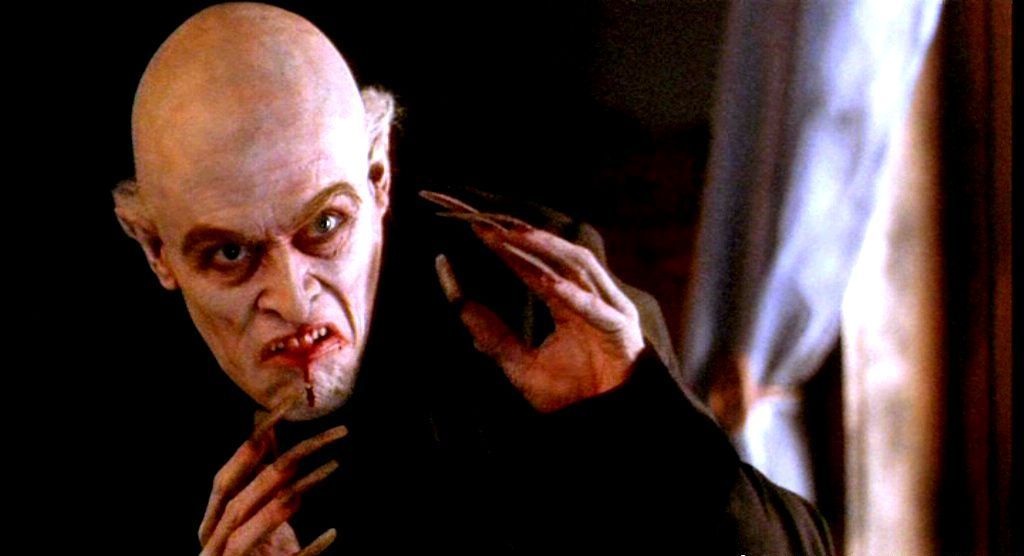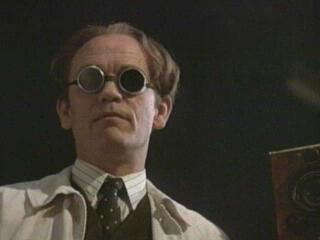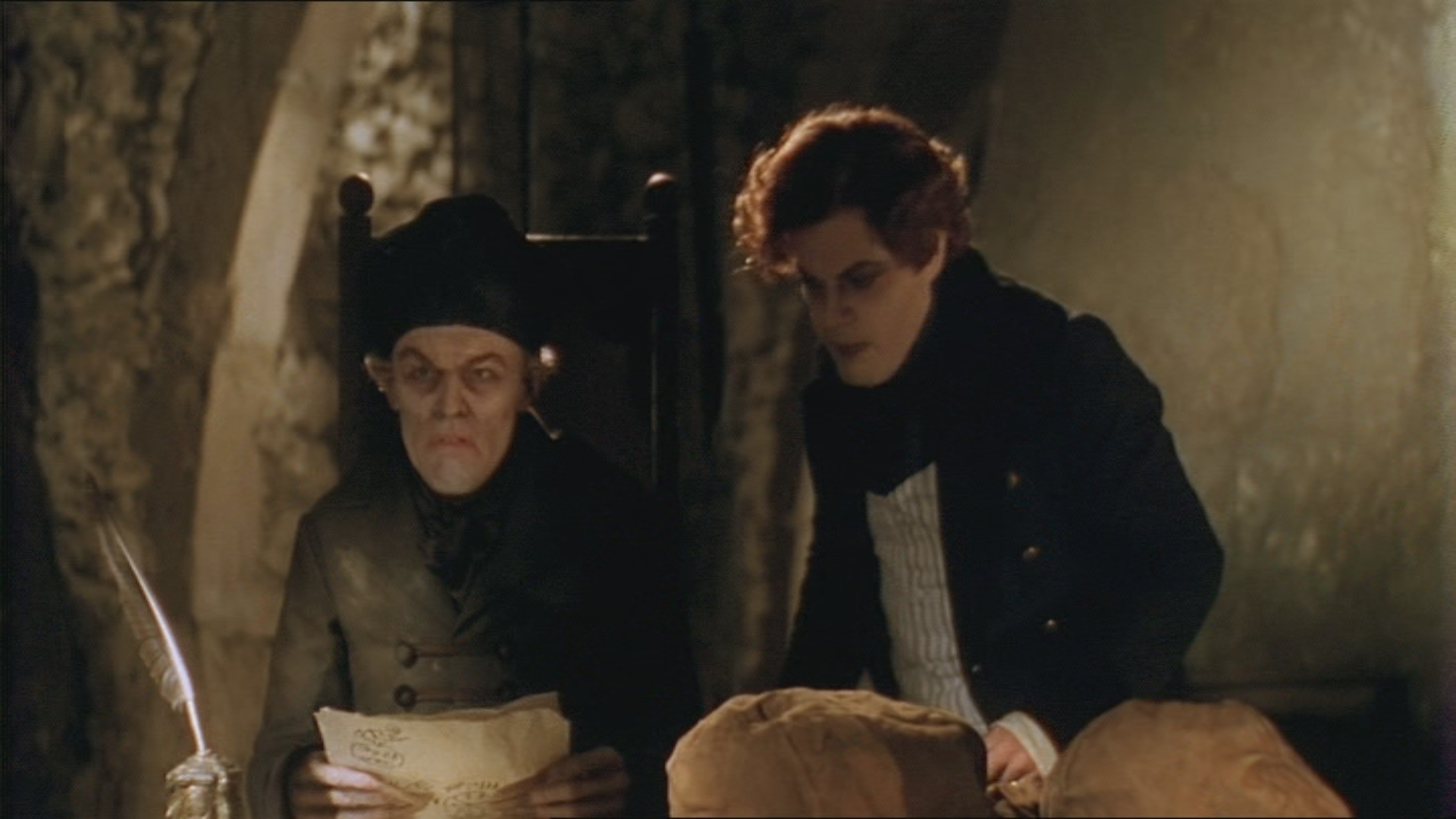
I heard about the movie from James Rolfe's "Monster Madness" review of the original silent classic, and gave it a watch out of pure excitement for how much I loved the concept of the film being shot with a real-life vampire. When the film was over, I was left baffled unsure if I thought if it was a good movie or not. It had some great performances, and cool visuals, but throughout my experience I found most of it to be dull and confusing that all led up to an insane finale that just suddenly ends the film abruptly right after it’s over. I didn't know what to make of this film for how weird and crazy it was that somehow felt lifeless in the long run. In spirit of the season, I've decided to give this film another look with more of a critical eye than I did before to see if it gets any better upon a second viewing.
Again (like in my review of "Last Action Hero" and both adaptations of "Horton Hears a Who") I already described the film's overall plot when talking about my first experience with the film, so I'm skipping my synopsis of the film.

The whole idea of shooting an iconic vampire film with an actual one sounded fascinating enough, but what really made me crave to see this film was that this famous rat-like vampire was being played by Willem Dafoe, who I thought was a perfect casting choice since he can play odd and deranged villainous characters so well, that even if he wasn't scary he'd still be as entertaining to watch as say Tim Curry playing a villain. When I casually watched his performance upon my first viewing, I was in love with it for how he became as subtly creepy as how Max Schreck played the vampire in the original, except now we can hear this famous character talk. And truthfully even though I do at times get the sense that Dafoe is putting on a thick Hungarian accent over his distinctive voice, his soft-spoken tone and eerie accent is how I most likely would expect the character of Count Orlok to sound-like based on his body language and background. Dafoe doesn't go as over the top as one would expect him too when playing the role, he legitimately gives his character a lot of dignity as if he was performing in a tragedy written by William Shakespeare. That's primarily because Max Schreck is a tragic character, that I have not picked-up on during my first viewing of the film for how subtle it is. Schreck understands the value of human life, but the problem is he's a vampire and must live by the rules of the dead otherwise he'll starve and die, and the more he's kept away from feeding on humans the more he has trouble controlling himself which will result to him acting animalistic by only thinking with his vampire instincts since it's in the nature of the beast. Because of Dafoe's phenomenally chilling performance, he was nominated for an Oscar for Best Supporting actor, and was hired to play the Green Goblin in "Spider-Man" after the producers saw him in this film (it just sucks that they had to give him such a silly mask that hides his terrifying face for the majority of the picture).

Increasing my appreciation for the film during my second viewing was the fact that Schreck isn't the film's only tragic monster. The portrayal of silent filmmaker F.W. Murnau (John Malkovich) is like watching Tim Burton's version of Edward D. Wood Jr. as if he was a madman! Murnau is a passionate filmmaker who wants to have his vision fully realized no matter what it takes. If he can't do an adaptation to "Dracula", he'll just simply change the names of the characters hoping that he won't get sued. If filming scenes on location is too expensive, he'll just do it anyway not caring how much money he spends. Every time Malkovich is on-screen he greatly expresses a burning passion of a determined artist for how he gleefully films his scenes as he narrates them to give the actor's a perfect description of what he envisions. But since his mind is always focused on his desires, he thinks more selfishly and jumps for the opportunity of casting a real-life vampire in his film without thinking rationally. He really doesn't need to cast the vampire since he's still required to act, and is only making things harder on himself and the people working with him considering that he has to keep Schreck from eating people while meeting his demands and playing up a charade that he's a method actor. But since the idea of casting a real-life vampire is guaranteed to bring chills to anyone who sees his movie for being 100% authentic than having an actor play the role, he's willing to put up with this extra set of problems that no filmmaker has ever had to deal with, even if it means sacrificing one of his stars as payment. And as the tensions with him working with Schreck increases he himself gradually grows insane to the point where it tears him apart leading him to feel that nobody else matters (including his star and his own-life) but the camera. Like Schreck, he puts people's life on the line to achieve what he desires, making him just as monstrous, and probably the film's true monster because he's not doing this for his health.

As I found more to appreciate from the two main stars, I began to find the supporting characters more appealing when originally I didn't find any of them to stand-out. None of them are as fascinating as the two characters that are always at each others throats, but there's still plenty of fun to be had with them for them to be memorable. Udo Kier does an entertaining job playing the tough and constantly stressed producer of the film Albin Grau who is always trying to reason with Murnau; Catherine McCormack as the leading lady of the film "Nosferatu" Greta Schroeder, captures the innocence of the role of Ellen Hutter when performing in-front of the camera, when off-camera she's a total diva who'd rather be performing on stage in-front of an audience than in front-of a camera; and Eddie Izzard as the actor portraying Hutter in the film does a perfect impersonation of mimicking Gustav von Wangenheim when being filmed. The supporting actor who steals the show and doesn't appear till the near end of the second act is Cary Elwes as Murnau's replacement photographer. Much like Murnau, he is very passionate about the art of film-making and uses a few unusual methods to get a shot or scene right not caring how strange his method and overall enthusiastic personality is, except that he's saner than his boss because he never goes too far when filming a scene his own special way. In some ways you could interpret his character as the filmmaker that Murnau thinks he is, when in reality Schreck reflects who Murnau truly is, just for how much he shares in common with these two.
The film may have a dark and twisted nature with plenty of deep thought given to its protagonist and antagonist, but it doesn't distance itself away too far from its dark comedy. That's the true beauty of this movie because no matter how dramatic and insane a scene is, there's still that touch of comedy that's not always being played-out directly at you. I mean let's be honest as ingeniously fascinating as the film's premise is, how could it not be a little funny? Just imagine all of the strange and crazy possibilities of working with a vampire who's posing himself as a method actor played on a comedic level. It's practically made to be written as a comedy. Two of the best scenes involving the film's dark sense of humor is when Schreck breaks-down and tries to feed on one of the crew members after seeing a sight of blood; and the monologue that Schreck gives to a drunk Albin and Henrik the screenwriter (Aden Gillett) about how he feels about the character of Dracula in the novel just simply because he has to prepare a meal for a mortal, that's then followed by him eating a bat in-front of them causing them to praise what a brilliant actor he is. These scenes are funny because of the interaction that the unsuspecting mortals share with Schreck that's backed by clever writing, and still comes off as both scary and tragic for how Dafoe plays this tormented blood-thirsty vampire. I heavily admire when comedies are able to fit the humor within' the emotions where it seems funny to us, but in their world it's serious business. The beauty of the film is even if you missed the jokes for how serious these moments play-out you'll still find one or two funny ones, whether it being from one of the supporting characters or a visual gag (like when they find a bottle of blood inside a picnic basket). And if you are in on the humor, you'll find it even funnier if you've seen the actual film (like how Izzard subtly makes fun of Hutter's over the top and flamboyant expressions), or studied and researched about the actual lives of the people being represented in film for how far-fetched that they are being portrayed. This may offend people who know the history feeling that it's giving people a false impression of how they act in real-life and that the deaths to some of the characters and Schreck being an actual vampire may indicate that they in reality didn't have a long term film career after this (which they most certainly did), but given that the film is making itself clear that it's a complete work of fiction with different layers of comedy attached to it despite being based loosely on real people and an existing film, I don't see no real harm in it. Though wouldn't it be interesting to see a biographical film about the real Murnau or Max Schreck given that "Nosferatu" is their only iconic work. I'd love to see a film exploring any one of those two careers with the second or final act focusing on working on the film that made them big.

The real fun of this movie (especially for fans of "Nosferatu") is watching the recreation of classic scenes that are nearly identical to the scenes from the original film from its shots, style of acting, and set design. I particularly love how most of the scenes that they film play part in the film's narrative rather than only being present as fan service for those who just want to see the classic scenes being remade. For example, when they shoot the scene of Hutter meeting Count Orlok, this is literally the first time when the characters (with the exception of Murnau) and we the audience are introduced to him, that plays as a loving homage to the original, and perfectly fitting his reveal within the fictional behind the scenes look of the making of the film. Later on when they film the scene of Hutter accidentally cutting himself when slicing a loaf of bread that reveals Orlok's lust for blood, Murnau intentionally causes the actor to cut himself while filming which results with Schreck having his first break-down, horrifically exposing the true monster that lie within' inside both characters with a chilling scene from a classic film being its basis. The film goes as far to be as long as the original film that's only longer by one minute and a few seconds, as well as having certain scenes take place around the same time frame where scenes in the original film did (we meet Schreck 5 or so minutes before the film reaches its half hour mark, like in the original), as well as providing occasional title cards to either provide background for the characters or move the story to the next scene, and transitioning from color to classic black-and-white for when Murnau starts filming. The film does a highly remarkable job of paying homage to the film from a visual and story-telling stand-point, but there are indeed a few noticeable alterations when visually depicting these scenes that prevent them from looking identical to the original. The most noticeable example is Schreck's design. Now I'm not saying that the make-up doesn't look scary on Dafoe's dastardly face, nor does it not resemble how Orlok appeared in the actual film, its just the changes are clearly obvious to anyone who has watched the original that it’s based on. He has buck teeth instead of fangs, and long sharp claws when Orlok simply had pointy nails, but those are minor when compared to his eyes. Orlok had eyes that were very rat-like that didn't seem human at all, the make-up team however doesn't try to darken Dafoe’s eyes to make them look like the creature of the night that he's supposed to be, so whenever we look into his eyes though frightening it's still clear that we're still looking at Dafoe's eyes. Orlok's design in "Are You Afraid of the Dark?" looked closer to the original Orlok, than Dafoe's design here. Still considering the amount of liberties that the film has already taken with the historical side of the characters, I don't see why this film can't do the same when recreating the imagery from "Nosferatu".
OVERALL THOUGHTS
I suppose I wasn’t in the right frame of mind when watching the film originally, because after giving it a second chance I discovered how masterful it truly was. The characterization of Murnau and Schreck and the relationship that they have is deeply fascinating that's carried by stellar performances from both actors. The film's black comedy extraordinarily fits the film's premise for how subtle and fun it is, as all the actors do an excellent job of playing with the humor while still taking their roles seriously. And the visuals serve the film's story perfectly well as it mostly captures the style and visual appeal of the film that this film is paying tribute to. It's a very rich and underrated vampire movie that's worth seeing for fans of classic horror. As for those who ever decide to rewatch "Nosferatu" and haven't already seen this film yet, I'd recommend seeing this first as a prologue before watching the film again. And if you're looking for an epilogue, "The Tale of the Midnight Madness" from "Are You Afraid of the Dark?" is not at all a bad way to go.
No comments:
Post a Comment